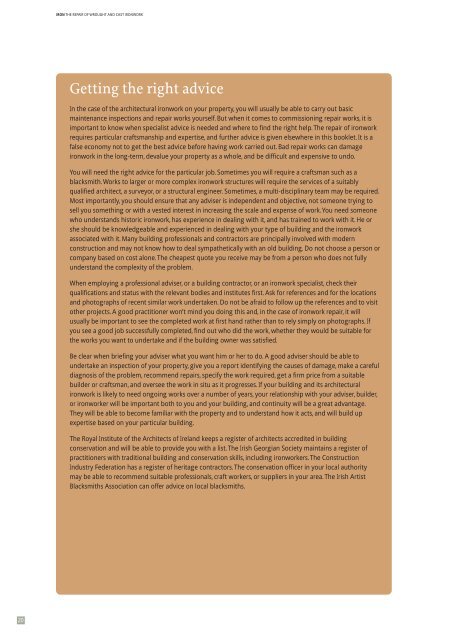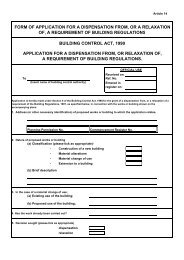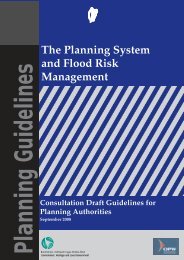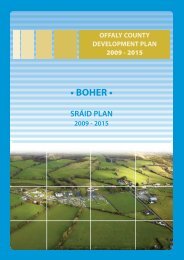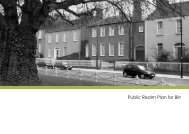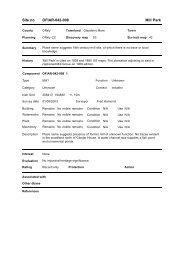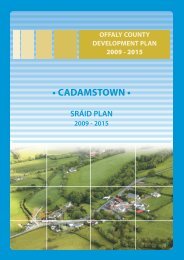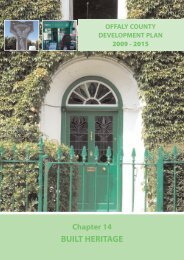The Repair of Wrought and Cast Iron Work - Dublin City Council
The Repair of Wrought and Cast Iron Work - Dublin City Council
The Repair of Wrought and Cast Iron Work - Dublin City Council
Create successful ePaper yourself
Turn your PDF publications into a flip-book with our unique Google optimized e-Paper software.
IRON THE REPAIR OF WROUGHT AND CAST IRONWORK<br />
Getting the right advice<br />
In the case <strong>of</strong> the architectural ironwork on your property, you will usually be able to carry out basic<br />
maintenance inspections <strong>and</strong> repair works yourself. But when it comes to commissioning repair works, it is<br />
important to know when specialist advice is needed <strong>and</strong> where to find the right help. <strong>The</strong> repair <strong>of</strong> ironwork<br />
requires particular craftsmanship <strong>and</strong> expertise, <strong>and</strong> further advice is given elsewhere in this booklet. It is a<br />
false economy not to get the best advice before having work carried out. Bad repair works can damage<br />
ironwork in the long-term, devalue your property as a whole, <strong>and</strong> be difficult <strong>and</strong> expensive to undo.<br />
You will need the right advice for the particular job. Sometimes you will require a craftsman such as a<br />
blacksmith. <strong>Work</strong>s to larger or more complex ironwork structures will require the services <strong>of</strong> a suitably<br />
qualified architect, a surveyor, or a structural engineer. Sometimes, a multi-disciplinary team may be required.<br />
Most importantly, you should ensure that any adviser is independent <strong>and</strong> objective, not someone trying to<br />
sell you something or with a vested interest in increasing the scale <strong>and</strong> expense <strong>of</strong> work. You need someone<br />
who underst<strong>and</strong>s historic ironwork, has experience in dealing with it, <strong>and</strong> has trained to work with it. He or<br />
she should be knowledgeable <strong>and</strong> experienced in dealing with your type <strong>of</strong> building <strong>and</strong> the ironwork<br />
associated with it. Many building pr<strong>of</strong>essionals <strong>and</strong> contractors are principally involved with modern<br />
construction <strong>and</strong> may not know how to deal sympathetically with an old building. Do not choose a person or<br />
company based on cost alone. <strong>The</strong> cheapest quote you receive may be from a person who does not fully<br />
underst<strong>and</strong> the complexity <strong>of</strong> the problem.<br />
When employing a pr<strong>of</strong>essional adviser, or a building contractor, or an ironwork specialist, check their<br />
qualifications <strong>and</strong> status with the relevant bodies <strong>and</strong> institutes first. Ask for references <strong>and</strong> for the locations<br />
<strong>and</strong> photographs <strong>of</strong> recent similar work undertaken. Do not be afraid to follow up the references <strong>and</strong> to visit<br />
other projects. A good practitioner won’t mind you doing this <strong>and</strong>, in the case <strong>of</strong> ironwork repair, it will<br />
usually be important to see the completed work at first h<strong>and</strong> rather than to rely simply on photographs. If<br />
you see a good job successfully completed, find out who did the work, whether they would be suitable for<br />
the works you want to undertake <strong>and</strong> if the building owner was satisfied.<br />
Be clear when briefing your adviser what you want him or her to do. A good adviser should be able to<br />
undertake an inspection <strong>of</strong> your property, give you a report identifying the causes <strong>of</strong> damage, make a careful<br />
diagnosis <strong>of</strong> the problem, recommend repairs, specify the work required, get a firm price from a suitable<br />
builder or craftsman, <strong>and</strong> oversee the work in situ as it progresses. If your building <strong>and</strong> its architectural<br />
ironwork is likely to need ongoing works over a number <strong>of</strong> years, your relationship with your adviser, builder,<br />
or ironworker will be important both to you <strong>and</strong> your building, <strong>and</strong> continuity will be a great advantage.<br />
<strong>The</strong>y will be able to become familiar with the property <strong>and</strong> to underst<strong>and</strong> how it acts, <strong>and</strong> will build up<br />
expertise based on your particular building.<br />
<strong>The</strong> Royal Institute <strong>of</strong> the Architects <strong>of</strong> Irel<strong>and</strong> keeps a register <strong>of</strong> architects accredited in building<br />
conservation <strong>and</strong> will be able to provide you with a list. <strong>The</strong> Irish Georgian Society maintains a register <strong>of</strong><br />
practitioners with traditional building <strong>and</strong> conservation skills, including ironworkers. <strong>The</strong> Construction<br />
Industry Federation has a register <strong>of</strong> heritage contractors. <strong>The</strong> conservation <strong>of</strong>ficer in your local authority<br />
may be able to recommend suitable pr<strong>of</strong>essionals, craft workers, or suppliers in your area. <strong>The</strong> Irish Artist<br />
Blacksmiths Association can <strong>of</strong>fer advice on local blacksmiths.<br />
20


